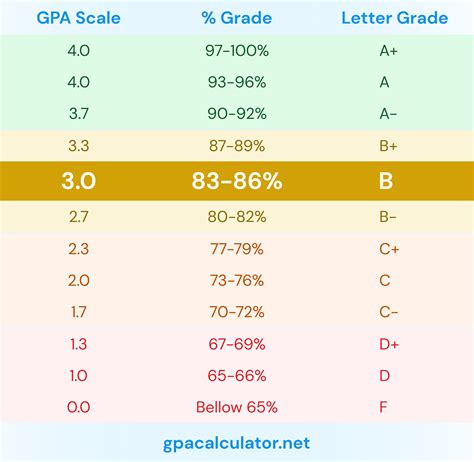Overview
The University of Georgia (UGA) utilizes a 4.0 scale to quantify students’ academic performance, fostering a consistent and transparent system for evaluating progress and achievement. Each letter grade corresponds to a numerical value, offering a clear framework for students to monitor their academic development. This article delves into the intricacies of the UGA GPA scale, shedding light on its components and nuances.

Letter Grades and Numerical Equivalents
The UGA GPA scale assigns specific numerical values to each letter grade, as outlined below:
| Letter Grade | Numerical Equivalent |
|---|---|
| A | 4.0 |
| A- | 3.7 |
| B+ | 3.3 |
| B | 3.0 |
| B- | 2.7 |
| C+ | 2.3 |
| C | 2.0 |
| C- | 1.7 |
| D+ | 1.3 |
| D | 1.0 |
| F | 0.0 |
Calculating Your GPA
Your GPA is a cumulative measure of your academic performance, calculated by dividing the total number of grade points earned by the total number of credit hours attempted. Grade points are determined by multiplying the numerical equivalent of each letter grade by the corresponding credit hours.
For example, if you earn a B+ in a 3-hour course and an A- in a 4-hour course, your grade points would be:
- B+: 3.3 x 3 = 9.9
- A-: 3.7 x 4 = 14.8
Total grade points: 9.9 + 14.8 = 24.7
Total credit hours: 3 + 4 = 7
GPA: 24.7 ÷ 7 = 3.53
Interpreting Your GPA
Your GPA serves as an indicator of your overall academic performance and provides valuable insights into your academic strengths and areas for improvement. A high GPA typically signifies academic excellence and dedication, while a lower GPA may suggest the need for additional support or a re-evaluation of study habits.
Using Your GPA
Your GPA plays a crucial role in various aspects of your academic journey, including:
- Academic Standing: A high GPA can contribute to maintaining satisfactory academic standing, which is required for continuation of studies and certain privileges.
- Scholarships and Awards: Many scholarships and awards are awarded based on GPA, recognizing academic achievement and financial need.
- Graduate School Admissions: Graduate schools often use GPA as a key criterion for admission, considering academic preparation and potential for success.
- Career Prospects: A strong GPA can enhance your employability and increase your competitiveness in the job market.
Strategies for Improving Your GPA
Enhancing your GPA requires a multifaceted approach, encompassing effective study habits, academic support resources, and personal commitment. Consider the following strategies:
- Set Realistic Goals: Break down large study tasks into smaller, manageable chunks. Focus on achievable goals to avoid feeling overwhelmed.
- Effective Study Habits: Implement active learning techniques, such as regular review, spaced repetition, and practice problems.
- Seek Support: Utilize resources such as tutoring, study groups, and academic advising to clarify concepts and improve understanding.
- Maximize Class Time: Engage actively in lectures, participate in discussions, and take comprehensive notes.
- Prioritize Assignments: Manage your time wisely, allocating adequate time for completing assignments with high quality.
- Seek Feedback: Engage with professors and TAs to seek feedback on your work and identify areas for improvement.
- Attend Office Hours: Utilize professors’ office hours to clarify material, ask questions, and build relationships.
Conclusion
The UGA GPA scale provides a standardized and transparent framework for students to understand their academic performance. By leveraging this scale effectively, students can monitor their progress, identify areas for improvement, and develop strategies to achieve academic excellence. Remember, your GPA is not just a numerical value but a reflection of your dedication, effort, and commitment to your academic pursuits.
